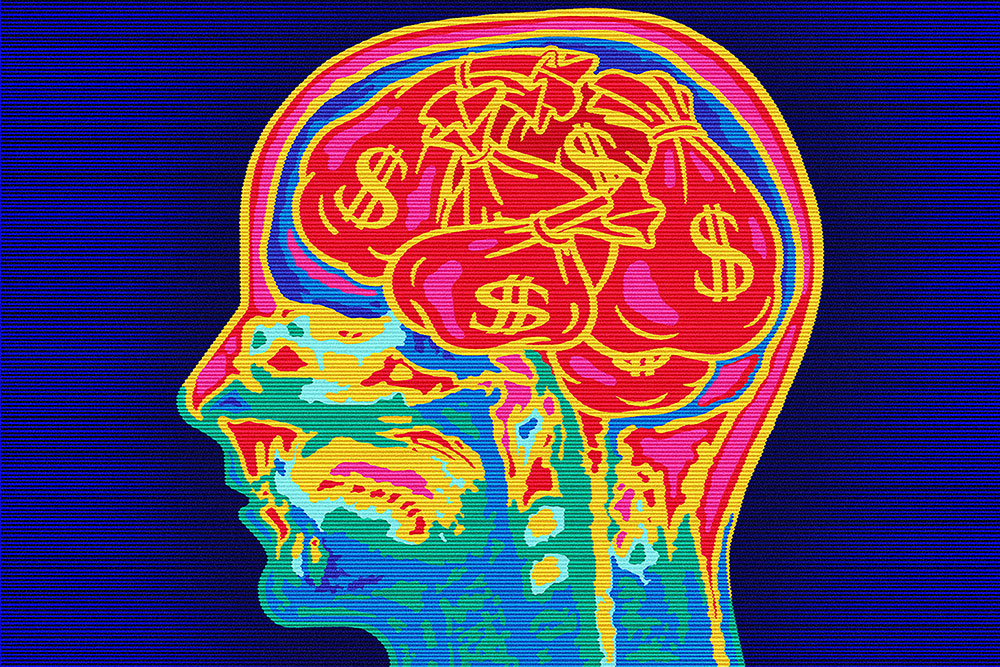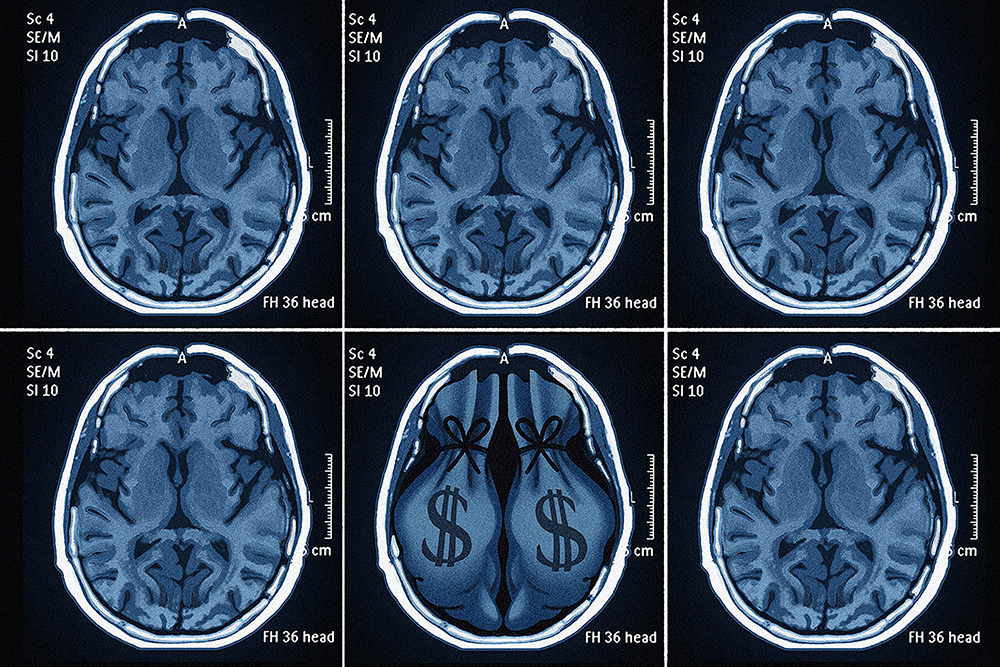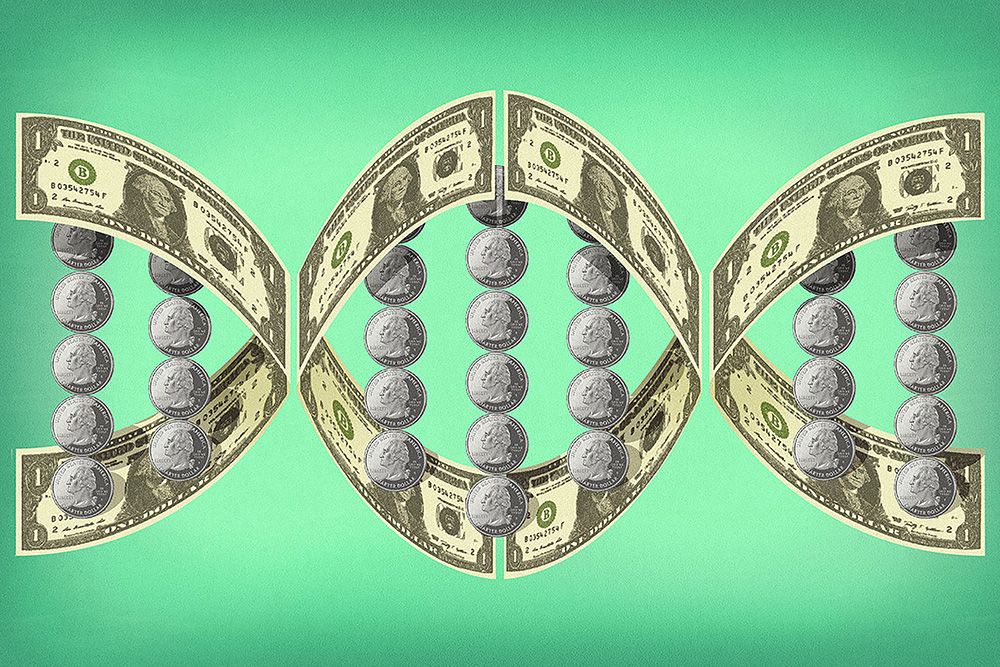
F·斯科特·菲茨杰拉德曾有一句名言说富人“跟你我之辈不一样”。
而最近一些超级富豪的怪异举动,确实有些“不同寻常”。有人热衷于冒险:有亿万富翁飞入太空,有人喜欢开赛车狂飙,还有人喜欢在不靠谱的观光之旅中潜入幽暗的深海。有些人看起来并不成熟:例如,世界首富埃隆·马斯克本可以给全世界做出无数贡献,或者轻松地喝杯凤梨可乐达晒晒太阳,但他却用自己宝贵的时间在网上讨论离谱的阴谋论,或者挑战另外一位富豪进行铁笼对决。
一个能积攒海量财富的聪明人为什么性格如此古怪?数亿甚至数十亿美元财富是否会让人分心?或者说一个人拥有能赚到数十亿美元财富的勇气和创造力,是否更有可能性格有些奇怪?
多年来,不同学科的科学家们一直被这些问题所困扰,毕竟,富翁们(主要是男性)表现出来各种迷惑行为,甚至有心理疾病的倾向,这并非先例。霍华德·休斯选择储藏自己的尿液;迈克尔·杰克逊耗费数百万美元,在自己的牧场和私人动物园里饲养了长颈鹿、鳄鱼、一头熊、大象和大猩猩;史蒂夫·乔布斯连续几周只吃胡萝卜和苹果,尽管皮肤变成了橘色。从英格兰的乔治三世到罗马帝国皇帝卡利古拉,超级富有的君主们也被普遍认为是“疯子”。
探究这些冲动行为背后的根源是心理学和神经学的研究范畴。有一些财富心理学家分析超级富豪,并帮助他们解决自身的罪恶感和焦虑。而神经经济学试图在弗洛伊德和荣格思想的基础上,结合神经学、认知学、行为学和社会心理学,以探究亿万富翁们心理背后的内部原理。
但在解释这些超级富豪们的怪癖行为时,少量研究给我们带来的最好的结论,反而是一些并不令人意外的观察结果。我们真的需要专业人士来告诉我们,那些身家超过2,500万美元的富豪“更关注自我而不是他人”?超级富豪们对于自己内部圈子以外的群体,例如为他们创造财富的员工,很难产生同理心,你会对此感到意外吗?白手起家的亿万富翁更加自恋,更有掌控欲,或者好胜心更强,这并不应该让我们感到吃惊。神经经济学领域的研究结论,可以用著名非科学家伯尼·桑德斯的话来总结,他认为亿万富翁们都有“精神问题”。

人们很容易嘲笑富豪们的怪癖,或者认为占总人口0.1%的富豪们的问题不值一提。但随着超级富豪们的生活变得日益极端,他们的问题也变得越来越极端。悲哀的是,“金钱买不到幸福”这句谚语在一些富豪们身上得到了验证,他们患上了一种名为“暴富综合征”的疾病,症状包括易怒、失眠、偏执、抑郁、焦虑和恐慌发作等。这或许可以解释为什么许多人通过服用含裸盖菇素的氯胺酮进行自我药物治疗,让混乱的大脑平静下来,或者在泡在冰水里的过程中坚持蓝莓饮食。
在2011年的一项心理学研究中,不幸福的亿万富翁们对波士顿学院(Boston College)财富与慈善中心(Center of Wealth and Philanthropy)的研究人员表示,他们面临的问题之一是他们感觉无论多少财富都远远不够。追求财富的过程永远没有终点。这项研究的1,000名受访者个人财富均不少于2,500万美元。他们提到了焦虑、不满意和缺乏财务安全感(令人费解)等感受。
《大西洋报》指出,一位受访者对研究人员表示,他的财富要达到十亿美元才会有安全感,他猜测“人类的身体不会进化到能够妥善应对当前容易摄入的大量脂肪和糖分的程度,即使在身体不允许的情况下也会渴望再吃一个奶酪汉堡,同样,人类也没有进化到可以应对过多金钱,人会渴望更多财富,即使这些财富已经变成了负担而不能带来舒适”。
这些个人的言论突出了富翁们面临的问题,但有一个核心问题依旧没有答案:为什么许多超级富豪生活却一团糟,为什么他们会行为怪异?后来另外一个学科基因经济学试图利用上世纪末人类基因图谱首次绘制完成以来可用的大量遗传信息回答这个问题。这是一个全新的领域,2007年被命名为基因经济学。这个领域的经济学家们认为,有些人生来具有财务成功的遗传倾向性,他们一直在寻找区分亿万富翁和普通人的“财富基因”。
他们的研究取得了一些进展,但问题是:研究发现,这种遗传倾向性通常可能伴随出现混乱的个性品质。出现这种现象的过程被称为基因多效性,即一个基因位点会影响两个甚至更多个性。研究显示,受教育程度(被视为预测致富概率的指标)与精神分裂、孤独症、焦虑性障碍和其他症状之间存在一定的相关性。
加州大学洛杉矶分校(UCLA)安德森管理学院(Anderson School of Management)和大卫·格芬医学院(David Geffen School of Medicine)教授丹尼尔·本杰明表示,事实证明,并不存在单一一种“财富基因”。他从事该领域的研究已经有二十多年时间。在本杰明对受教育程度的研究中,他和同事并没有在众多基因组中大海捞针寻找一种基因,而是确定了3,952种独特的“单核苷酸多态性”,而且他确定还有更多有待发现。他们假设,通过从人类染色体中发现的这些与受教育程度有关的“单核苷酸多态性”,可以找到创业精神的遗传学依据。单核苷酸多态性以令人眼花缭乱的联结和组合发挥作用,形成各种各样的人类多样性,例如一种成为高管和买得起超级游艇的遗传倾向性,与接受不着边际的阴谋论的倾向性相结合。
不墨守成规能带来大量创新,例如从奇亚宠物到个人电脑等。但它也会导致人们对现实产生令人担忧的误解。例如众所周知,亨利·福特曾痴迷于《锡安长老会纪要》(Protocols of the Elders of Zion);靠枕头发家的亿万富翁迈克·林德尔坚信一种关于投票机器的虚假说法;埃隆·马斯克附和Q-Anon阴谋论等。

愿意接受稀奇古怪的新想法,比如一台可以放音乐、拍视频和翻译斯瓦西里语的便携式电话,这是创造财富的关键。本杰明博士表示,他们有理由认为他和同事正在研究的单核苷酸多态性与超级开明的思想有关。他对《财富》杂志表示:“如果它的副作用是有特别灵活的头脑,愿意寻求大量不同观点,我不会感到意外。有些个性可能有助于在商场上取得成功……但如果放到疫苗或其他问题的背景下,这些个性会让人们认为它们都是阴谋论。”
我曾询问本杰明教授,未来是否会有人找到定义亿万富翁染色体的多基因索引。他说道:“我认为会的。”本杰明教授预测在未来十年内,其研究的学科将会趋于成熟,即基因数据将被纳入主流社会科学研究。因此,一个新时代或许将在不久之后降临,直升机式育儿将在孩子出生前就已经开始。
但考虑到获得财富与心理问题之间可能存在的联系,这种干涉是否合适?本杰明博士指出,这种胚胎选择如果大规模进行,会加剧不平等,而且可能产生其他负面后果:“可能有更多人出现精神问题。”如果被预先编辑赚钱基因的后代,更有可能出现围着一套豪宅徘徊、微剂量使用致幻剂LSD和发送语气暴躁的推文等行为,又该怎么办?
这种育儿困境依旧是假设,但它提出了一个有趣的问题:如果说超级富豪们的独特性以及做出奇怪举动的倾向,都源于他们的遗传代码,那么这种怪异的组合是否可能是他们能够获取财富的原因,而不是财富对他们的影响?如果答案是肯定的,那么亿万富翁们的特立独行,应该是人们追求而不是避免的品质。
当然,在当今世界,有些人生来就享有大量特权和机遇,而有些人却要面对艰难险阻和重重障碍,因此在任何人的成功故事中,基因只发挥了一小部分作用。任何与成就有关的观念如果过于相信生物决定论,还可能演变成令人讨厌的优生学,而这个领域存在各种扭曲的观念和种族主义。
此外,本杰明教授指出,虽然他对遗传学很感兴趣,但在人类行为方面,有许多因素的影响与遗传学特征一样强大,可能使超级富豪们出现行为混乱。就连行业巨头也难以逃避同辈压力的影响,他们希望不被其他亿万富翁落在身后。
本杰明表示:“如果你的朋友们要去外太空,你也会有这样的念头。”他若有所思地说道:“或许,是因为无聊吧。”(财富中文网)
翻译:刘进龙
审校:汪皓
F·斯科特·菲茨杰拉德曾有一句名言说富人“跟你我之辈不一样”。
而最近一些超级富豪的怪异举动,确实有些“不同寻常”。有人热衷于冒险:有亿万富翁飞入太空,有人喜欢开赛车狂飙,还有人喜欢在不靠谱的观光之旅中潜入幽暗的深海。有些人看起来并不成熟:例如,世界首富埃隆·马斯克本可以给全世界做出无数贡献,或者轻松地喝杯凤梨可乐达晒晒太阳,但他却用自己宝贵的时间在网上讨论离谱的阴谋论,或者挑战另外一位富豪进行铁笼对决。
一个能积攒海量财富的聪明人为什么性格如此古怪?数亿甚至数十亿美元财富是否会让人分心?或者说一个人拥有能赚到数十亿美元财富的勇气和创造力,是否更有可能性格有些奇怪?
多年来,不同学科的科学家们一直被这些问题所困扰,毕竟,富翁们(主要是男性)表现出来各种迷惑行为,甚至有心理疾病的倾向,这并非先例。霍华德·休斯选择储藏自己的尿液;迈克尔·杰克逊耗费数百万美元,在自己的牧场和私人动物园里饲养了长颈鹿、鳄鱼、一头熊、大象和大猩猩;史蒂夫·乔布斯连续几周只吃胡萝卜和苹果,尽管皮肤变成了橘色。从英格兰的乔治三世到罗马帝国皇帝卡利古拉,超级富有的君主们也被普遍认为是“疯子”。
探究这些冲动行为背后的根源是心理学和神经学的研究范畴。有一些财富心理学家分析超级富豪,并帮助他们解决自身的罪恶感和焦虑。而神经经济学试图在弗洛伊德和荣格思想的基础上,结合神经学、认知学、行为学和社会心理学,以探究亿万富翁们心理背后的内部原理。
但在解释这些超级富豪们的怪癖行为时,少量研究给我们带来的最好的结论,反而是一些并不令人意外的观察结果。我们真的需要专业人士来告诉我们,那些身家超过2,500万美元的富豪“更关注自我而不是他人”?超级富豪们对于自己内部圈子以外的群体,例如为他们创造财富的员工,很难产生同理心,你会对此感到意外吗?白手起家的亿万富翁更加自恋,更有掌控欲,或者好胜心更强,这并不应该让我们感到吃惊。神经经济学领域的研究结论,可以用著名非科学家伯尼·桑德斯的话来总结,他认为亿万富翁们都有“精神问题”。
人们很容易嘲笑富豪们的怪癖,或者认为占总人口0.1%的富豪们的问题不值一提。但随着超级富豪们的生活变得日益极端,他们的问题也变得越来越极端。悲哀的是,“金钱买不到幸福”这句谚语在一些富豪们身上得到了验证,他们患上了一种名为“暴富综合征”的疾病,症状包括易怒、失眠、偏执、抑郁、焦虑和恐慌发作等。这或许可以解释为什么许多人通过服用含裸盖菇素的氯胺酮进行自我药物治疗,让混乱的大脑平静下来,或者在泡在冰水里的过程中坚持蓝莓饮食。
在2011年的一项心理学研究中,不幸福的亿万富翁们对波士顿学院(Boston College)财富与慈善中心(Center of Wealth and Philanthropy)的研究人员表示,他们面临的问题之一是他们感觉无论多少财富都远远不够。追求财富的过程永远没有终点。这项研究的1,000名受访者个人财富均不少于2,500万美元。他们提到了焦虑、不满意和缺乏财务安全感(令人费解)等感受。
《大西洋报》指出,一位受访者对研究人员表示,他的财富要达到十亿美元才会有安全感,他猜测“人类的身体不会进化到能够妥善应对当前容易摄入的大量脂肪和糖分的程度,即使在身体不允许的情况下也会渴望再吃一个奶酪汉堡,同样,人类也没有进化到可以应对过多金钱,人会渴望更多财富,即使这些财富已经变成了负担而不能带来舒适”。
这些个人的言论突出了富翁们面临的问题,但有一个核心问题依旧没有答案:为什么许多超级富豪生活却一团糟,为什么他们会行为怪异?后来另外一个学科基因经济学试图利用上世纪末人类基因图谱首次绘制完成以来可用的大量遗传信息回答这个问题。这是一个全新的领域,2007年被命名为基因经济学。这个领域的经济学家们认为,有些人生来具有财务成功的遗传倾向性,他们一直在寻找区分亿万富翁和普通人的“财富基因”。
他们的研究取得了一些进展,但问题是:研究发现,这种遗传倾向性通常可能伴随出现混乱的个性品质。出现这种现象的过程被称为基因多效性,即一个基因位点会影响两个甚至更多个性。研究显示,受教育程度(被视为预测致富概率的指标)与精神分裂、孤独症、焦虑性障碍和其他症状之间存在一定的相关性。
加州大学洛杉矶分校(UCLA)安德森管理学院(Anderson School of Management)和大卫·格芬医学院(David Geffen School of Medicine)教授丹尼尔·本杰明表示,事实证明,并不存在单一一种“财富基因”。他从事该领域的研究已经有二十多年时间。在本杰明对受教育程度的研究中,他和同事并没有在众多基因组中大海捞针寻找一种基因,而是确定了3,952种独特的“单核苷酸多态性”,而且他确定还有更多有待发现。他们假设,通过从人类染色体中发现的这些与受教育程度有关的“单核苷酸多态性”,可以找到创业精神的遗传学依据。单核苷酸多态性以令人眼花缭乱的联结和组合发挥作用,形成各种各样的人类多样性,例如一种成为高管和买得起超级游艇的遗传倾向性,与接受不着边际的阴谋论的倾向性相结合。
不墨守成规能带来大量创新,例如从奇亚宠物到个人电脑等。但它也会导致人们对现实产生令人担忧的误解。例如众所周知,亨利·福特曾痴迷于《锡安长老会纪要》(Protocols of the Elders of Zion);靠枕头发家的亿万富翁迈克·林德尔坚信一种关于投票机器的虚假说法;埃隆·马斯克附和Q-Anon阴谋论等。
愿意接受稀奇古怪的新想法,比如一台可以放音乐、拍视频和翻译斯瓦西里语的便携式电话,这是创造财富的关键。本杰明博士表示,他们有理由认为他和同事正在研究的单核苷酸多态性与超级开明的思想有关。他对《财富》杂志表示:“如果它的副作用是有特别灵活的头脑,愿意寻求大量不同观点,我不会感到意外。有些个性可能有助于在商场上取得成功……但如果放到疫苗或其他问题的背景下,这些个性会让人们认为它们都是阴谋论。”
我曾询问本杰明教授,未来是否会有人找到定义亿万富翁染色体的多基因索引。他说道:“我认为会的。”本杰明教授预测在未来十年内,其研究的学科将会趋于成熟,即基因数据将被纳入主流社会科学研究。因此,一个新时代或许将在不久之后降临,直升机式育儿将在孩子出生前就已经开始。
但考虑到获得财富与心理问题之间可能存在的联系,这种干涉是否合适?本杰明博士指出,这种胚胎选择如果大规模进行,会加剧不平等,而且可能产生其他负面后果:“可能有更多人出现精神问题。”如果被预先编辑赚钱基因的后代,更有可能出现围着一套豪宅徘徊、微剂量使用致幻剂LSD和发送语气暴躁的推文等行为,又该怎么办?
这种育儿困境依旧是假设,但它提出了一个有趣的问题:如果说超级富豪们的独特性以及做出奇怪举动的倾向,都源于他们的遗传代码,那么这种怪异的组合是否可能是他们能够获取财富的原因,而不是财富对他们的影响?如果答案是肯定的,那么亿万富翁们的特立独行,应该是人们追求而不是避免的品质。
当然,在当今世界,有些人生来就享有大量特权和机遇,而有些人却要面对艰难险阻和重重障碍,因此在任何人的成功故事中,基因只发挥了一小部分作用。任何与成就有关的观念如果过于相信生物决定论,还可能演变成令人讨厌的优生学,而这个领域存在各种扭曲的观念和种族主义。
此外,本杰明教授指出,虽然他对遗传学很感兴趣,但在人类行为方面,有许多因素的影响与遗传学特征一样强大,可能使超级富豪们出现行为混乱。就连行业巨头也难以逃避同辈压力的影响,他们希望不被其他亿万富翁落在身后。
本杰明表示:“如果你的朋友们要去外太空,你也会有这样的念头。”他若有所思地说道:“或许,是因为无聊吧。”(财富中文网)
翻译:刘进龙
审校:汪皓
F. Scott Fitzgerald famously noted that the rich are “different from you and me.”
And indeed, some of the recent antics of the super-rich have been… sure, let’s call it “different.” There’s the extreme risk-taking: billionaires jettisoning themselves into space, careening around in race cars, or plunging themselves into the darkest depths of the sea on questionable sightseeing tours. Then there’s the seeming immaturity: Elon Musk, for example, the wealthiest man on earth, could be doing untold good in the world—or simply basking in the sun sipping piña coladas—but instead he spends his days arguing online about wild conspiracy theories, or challenging a fellow plutocrat to a cage fight.
What makes a person with the savvy to amass such a spectacular fortune so erratic? Is there something about that pile of millions or billions that drives a person to distraction? Or is anyone with the guts and creativity to make billions just more likely to be a little strange in the first place?
These are questions that have stumped scientists from various disciplines for many years—after all, today’s crop of very rich guys (and they are mostly guys) are hardly the first to exhibit puzzling behavior, sometimes appearing to tip into mental illness. Howard Hughes hoarded his urine; Michael Jackson spent millions to bring giraffes, alligators, a bear, elephants, and apes to live at his ranch and private zoo; and Steve Jobs munched on nothing but carrots and apples for weeks, despite his skin turning orange. Filthy rich monarchs from England’s George III to the Roman emperor Caligula were widely considered “mad.”
Probing the origins of these impulses has been the purview of psychology and neurology. There are wealth psychologists to analyze the super rich and help them deal with their guilt and angst. Neuroeconomics, meanwhile, attempts to take Freud and Jung a step further by combining neuroscience, cognitive science, behavioral science, and social psychology to lay bare the inner workings of the billionaire’s mind.
But when it comes to explaining the strange behavior of some of these ultra-high-net-worth individuals, the best that all this shrinkage has been able to come up with is a rather un-startling set of observations. Did we really need a professional to tell us that those worth more than $25 million are “focused more on themselves than on others”? Does it come as a surprise that the super-rich may struggle to feel empathy toward groups outside their inner circle—such as the legions of workers that create their wealth? It should not, perhaps, shock anyone that the self-made billionaire may possess an extra shot of narcissism, that they like to be in control, or that they are extremely competitive. The field’s conclusions could be summed up by the famous non-scientist Bernie Sanders, when he observed that billionaires have “psychiatric issues.”
It’s easy to mock, to break out the world’s tiniest violin for the problems of the top tenth of the 1%. But as the lives of the super-rich have increasingly veered into extremes, so have their problems. The adage that “money can’t buy happiness” has proved tragically true for the gilded victims of what has come to be known as “Sudden Wealth Syndrome”—who suffer from irritability, insomnia, paranoia, depression, anxiety, and panic attacks. That may be a part of why so many soothe their reeling brains with ketamine, self-medicate with psilocybin, or submit to an unwavering diet of blueberries between dunks in an ice bath.
Part of the problem, unhappy multimillionaires told researchers from Boston College’s Center of Wealth and Philanthropy in a 2011 psychological study, is the feeling that no amount of wealth feels like enough. There’s never a point where one can stop craving more. The study’s 1,000 respondents, each worth at least $25 million, described feelings of anxiety, dissatisfaction, and—perplexingly—financial insecurity.
One respondent told researchers that he would not feel secure until he had amassed a billion dollars, the Atlantic noted, hypothesizing that “just as the human body didn’t evolve to deal well with today’s easy access to abundant fat and sugars, and will crave an extra cheeseburger when it shouldn’t, the human mind, apparently, didn’t evolve to deal with excess money, and will desire more long after wealth has become a burden rather than a comfort.”
Those reams of personal testimony highlighted the problem, but left the central question unanswered: Why are so many extremely rich people miserable, and why do they act so strangely? Lately another scholarly genre, genoeconomics, has risen to attempt to answer the question using the trove of genetic information that has become available since the end of last century, when the human genome was first mapped. Scientists in this new field—its name was coined in 2007—suggest that some people are born with a propensity for financial success, and they have been searching for a “wealth gene” that separates billionaires from the rest of us.
They have made some progress, but here’s the rub: Such a genetic propensity, it turns out, appears to often be coupled with the likelihood of disordered personality traits. That’s via a process known as pleiotropy—the phenomenon in which one genetic locus affects two or more traits. Research has shown some correlation between educational attainment (seen as a proxy for likelihood to get rich) and a predisposition to schizophrenia, autism, anxiety disorders, and other conditions.
It turns out that there’s no one “wealth gene,” says Daniel Benjamin, a Professor at UCLA’s Anderson School of Management and the David Geffen School of Medicine, who has worked in the field for two decades. In Benjamin’s studies of educational attainment, instead of a single genetic needle in the genomic haystack, he and his colleagues have identified 3,952 distinct “single-nucleotide polymorphisms”—and he’s sure they haven’t yet found them all. The assumption is these SNPs (pronounced “snips”) associated with educational attainment, out of the millions in the human genome, tell us something about the genetic basis of an entrepreneurial spirit. SNPs work in bewildering conjunctions and combinations to create all sorts of human diversity—which may include, for example, the pairing of a propensity toward C-suites and superyachts with an openness to wild conspiracy theories.
Thinking “outside the box” has certainly led to plenty of innovation, from the chia pet to the personal computer. It has also led to some alarming misunderstandings of reality—Henry Ford’s infamous obsession with the Protocols of the Elders of Zion; pillow multimillionaire Mike Lindell’s fixation with a false narrative about voting machines; Elon Musk’s flirtations with Q-Anon.
A willingness to embrace bizarre new ideas—perhaps a portable phone that can also play music, shoot a movie, and translate Swahili?—could be the key to making a fortune. And there’s reason to think that the SNPs Dr. Benjamin and his team is studying are associated with a kind of extreme open-mindedness, he says. “I wouldn’t be surprised if a side effect were being especially intellectually flexible, seeking out lots of different kinds of opinions,” he tells Fortune. “These are probably characteristics that are helpful for being successful in the business world… When you apply it in the context of vaccines or whatever it starts to look like conspiracy theories.”
I asked Professor Benjamin if at some point in the future, someone will come up with the polygenic index that defines the genome of a billionaire. “I think it’s going to happen,” he said. Professor Benjamin estimates that within ten years, this science will reach maturity, in the sense that genetic data will be incorporated into mainstream research in social science. So it may not be long before the phenomenon will usher in a new era of helicopter parenting that begins before birth.
But given the possible association of wealth acquisition with psychological distress, is such meddling advisable? Dr. Benjamin points out that this kind of embryo selection, if it were to happen on a large scale, could increase inequality, and it could have other negative consequences: “There might be more people with certain psychiatric conditions.” What if this progeny pre-programmed for money-making zeal is also more likely to end up wandering around a mansion, micro-dosing LSD and sending peevish tweets?
This still-hypothetical parental dilemma raises an intriguing question: If the peculiarities of the super-rich are locked within their genetic code alongside tendencies to outlandish compulsion, might these combined oddities be the cause of their wealth, not its effect? In that case, the billionaire’s strangeness might not be something to be shunned, but sought.
Of course in a world where some people are born with enormous privilege and opportunity, and many others face massive barriers and disadvantages, genetics can only play a bit part in a success story. Any notion of achievement that rests too heavily on biological determinism also runs the risk of veering into the unsavory field of eugenics, with all its distortions and racism.
Besides, Professor Benjamin points out despite his interest in genetics, when it comes to human behavior, there are plenty of forces just as powerful as heredity that might be driving the super-wealthy toward chaotic behavior. Even titans of industry aren’t immune to peer pressure—the desire to keep up with the billionaire next door.
“If your friends are going to outer space, then that’s what you want to do,” Benjamin says. “Perhaps,” he muses, “it’s boredom.”






